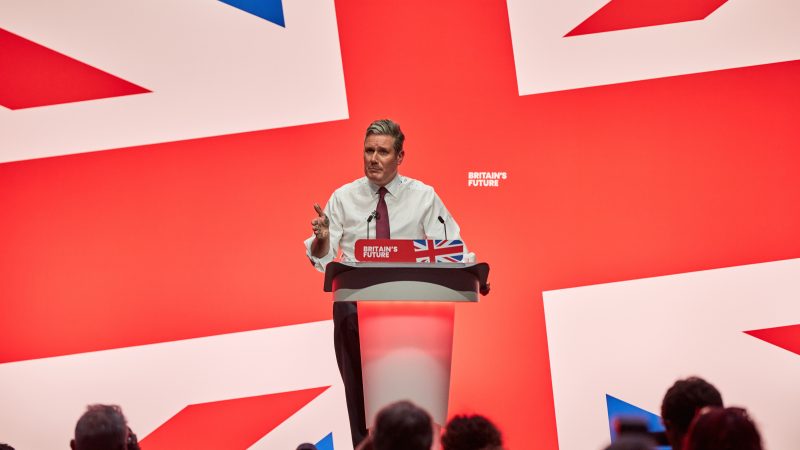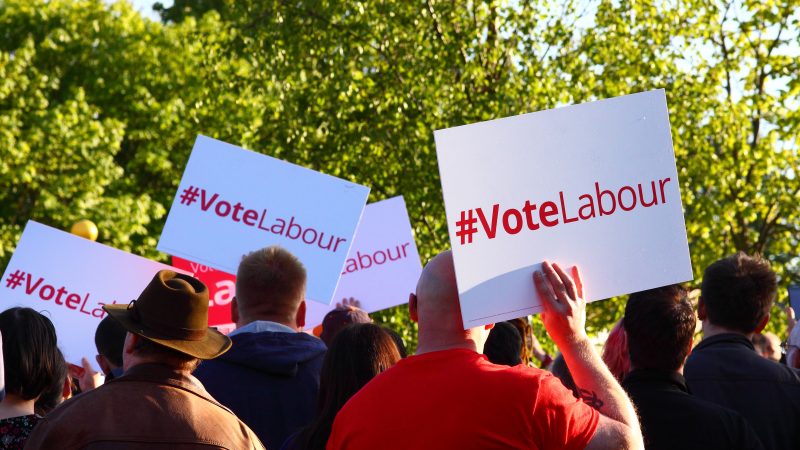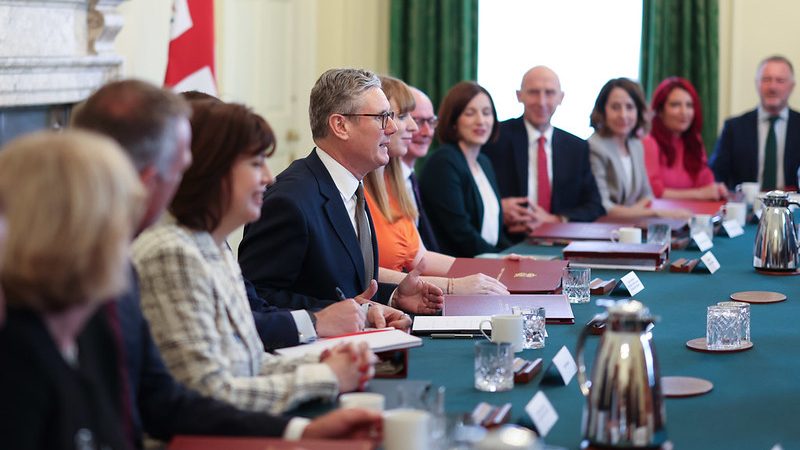UK
Revealed: PM’s allies help snuff out thorny women’s conference motions on winter fuel, two-child cap and gender
 :
:Labour women members’ attempts to shape policy on thorny issues including the winter fuel allowance, sex and gender policy and the two-child benefit cap have been frustrated, after supporters of the party leadership lobbied delegates to women’s conference to pick less sensitive topics for debate, LabourList can reveal.
In the lead-up to the party’s annual women’s conference this Saturday in Liverpool, Constituency Labour Parties and affiliated unions and societies had submitted dozens of motions on issues particularly affecting women, which they hoped to see debated, and then sent on for a floor vote at the main conference.
Starmer allies mobilise ahead of conference
The process for women’s conference sees motions whittled down in advance however, first ruled in or out on procedural grounds, and then grouped into subjects. Delegates attending are then also balloted in advance on which subjects should be picked for debate, with three CLP choices and three union choices.
The campaign group Labour to Win, which played a key role in Keir Starmer’s campaign to become party leader, wrote to some delegates hours before the recent vote, urging them to pick three of the 18 subjects motions were filed on this year: women’s health, women in the economy, and education and girls.
An email seen by LabourList told delegates that picking these themes would ensure a “wide range of topics are discussed, while remaining committed to the Labour Party’s priorities, supporting Keir Starmer, Angela Raynor and the Cabinet to build the best possible Britain for women and girls”.
Further party correspondence seen by LabourList suggests delegates then did vote to approve these three subjects in the ballot, alongside three union-backed themes: violence against women and girls in the workplace, women in the workplace, and women as working parents and carers.
The decision means motions which fell into a string of other categories will not be voted on: antisocial behaviour, border security command, child poverty, domestic and sexual abuse, female genital mutilation, Great British Energy, social care, tackling hate, the Equality Act, trans rights, women and pensions, and women in Palestine.
Some of the motions would likely have sparked controversy, and the avoidance of votes is likely to come as a relief to senior figures as Labour prepares for one of its most high-profile, heavily scrutinised conferences in years with the party now in government. Some emergency motions on thornier topics could still emerge, however.
Winter fuel protest motion rejected
One motion by members in Shrewsbury, calling on the party to either retain winter fuel payments as a universal benefit or significant increase the threshold for pension credit, will therefore not make the cut, as it fell into the rejected ‘Great British Energy’ category.
The motion had warned: “Means testing the winter fuel payment is a regressive move which will hit the most vulnerable hardest, and women in particular”, causing “severe hardship” to those who rely on their state pension.
Two-child cap not on the agenda
Four CLPs had filed motions on the two-child benefit cap, with Labour’s refusal to ditch it to date sparking ongoing controversy within the party.
But all fell into the rejected ‘child poverty’ category, which included motions backed by campaign groups Campaign for Labour Party Democracy and Labour Women’s Declaration, but which not enough delegates voted for it to make it to the conference floor.
Poole CLP had said in their motion: “Key to addressing the scandal of child poverty will be the removal of the iniquitous two child benefits cap and we call on the Labour government to make this change as a matter of urgency.”
Mid Bedfordshire, Halifax and Erith and Thamesmead CLPs had filed similar motions warning: “Labour cannot achieve its objective of reducing child poverty without scrapping the two-child limit…It’s immoral to treat some children as less deserving than others because of the circumstances of their birth.
“Women’s Conference calls upon the Labour government to abolish the two-child limit as soon as possible as an urgent priority.”
No motions on trans rights
Meanwhile one Equality Act motion that will not make the cut was a Glasgow Cathart submission which called for the party to “commit to a tightening of the definition of ‘women’ in the Equality Act to mean biological women only”, and to oppose any reform of gender recognition across the UK or Scotland.
Another unsuccessful motion from North Shropshire CLP had Labour to “acknowledge the principle of women’s sex-based rights and clarify ‘sex’ in law means ‘biological sex’.”
A further motion by Manchester Central CLP had urged the party to stick to a manifesto pledge on reforming gender recognition law, deliver a trans-inclusive ban on conversion therapy and make hate crime motivated by sexual orientation and transgender identity aggravated offences.
Palestine motion also doesn’t get through
The ‘women in Palestine’ category also failed to make the floor, though only one approved morion was filed under the header, and the motion did not appear to go far beyond current party policy.
Tamworth CLP had called for an immediate ceasefire, unimpeded aid into Gaza, the recognitino of Palestine as part of a renewed peace process, and Labour playing a “full diplomatic role” securing a deal and peace process.
Labour was not immediately available for comment.
Anger as women’s conference assigned only 20 minutes to debate each motion

Labour women members have voiced their anger at only having around 20 minutes to debate each policy motion at the women’s conference tomorrow, after the party further scaled back the annual event.
Only six motions will be debated at the women’s conference, taking place the day before events for the national conference kick off in Liverpool, with the amount of time for debate on policy motions cut from three hours last year to just two.
It comes a year after the conference was controversially cut from two days down to one.
Rachel Garnham, co-chair of the Campaign for Labour Party Democracy (CLPD) and a former Labour national executive committee member, told LabourList: “CLPD has been disappointed to see the further diminishing of women’s voices in the Labour Party with a smaller, deprioritised, top-down women’s conference this year.
“20 minutes for discussion on crucial topics is an insult.
“Grassroots women members and trade unions bring a valuable perspective that Labour in government need to listen to in order to deliver the change women need.
“CLPD continues to call for a two-day, policy-making spring women’s conference where women’s voices can genuinely be heard.”
A video filmed by one delegate comparing the level of information about its women’s and its main conference has been circulating among frustrated women members.
Sammy Wentworth, a delegate from Bexleyheath and Crayford CLP, said it “sickens me” after filming herself flicking through the long main programme, comparing it to the single A4 sheet she has about the women’s event.
A recent CLPD email to its members urged delegates to vote for three candidates at the conference to the Women’s Conference Arrangements Committee (CAC) who back the restoration of a standalone two-day policy-making conference that is separate from annual conference, as well as for an agenda “that includes as much input from grassroots women members and trade unionists as possible.”
Jean Crocker of CLPD, one of the candidates for the Women’s CAC election, said: “At the two-day women’s conferences, we had eight motion debates. When we were cut to one day in 2023, there was pressure to have only four – but we held firm on six, which increased the number of grassroots CLP voices heard, and the same has happened in 2024.
“We are calling for a return to a two-day standalone women’s conference in 2025.”
Two other candidates, Louise Irvine and Lynne Troughton, backed by the gender-critical group Labour Women’s Declaration, also expressed their commitment to fighting to restore the two-day conference.
They said: Labour’s rulebook commits to an effective National Women’s Committee to leading on political policy work with women. Previously it was held as a two day policy-making conference in the spring, at a different time of year from Labour’s Annual Conference. In standing for the WCAC, we would campaign to re-establish this.
Teresa Gray, women’s officer in Bexley and Sidcup CLP, said she was “appalled” by the cuts to the conference and said: “Conference appears to have lost its role in shaping policies for women.”
She said that the reduction to just one day last year “diminished the status of the conference” and claimed motions chosen in advance “seemed carefully chosen not so much to support debate as consensus”.
One CLP officer, who wished to remain anonymous, said: “I have been a long-time Starmer supporter.
“Two hours to discuss six motions plus emergency motions is derisory. Come on Labour. Women matter.”
The Labour Party was approached for comment.
THEY DON'T
‘Women at the table – why Labour women’s voices matter’

Labour women from across the country will arrive in Liverpool tomorrow to make sure women’s voices are heard, in a party transformed, for the Annual National Women’s Conference.
There are currently 187 Labour women MPs in Parliament (46% of the Parliamentary Labour Party) making up 263 women MPs in total in the House of Commons. They bring hope for change not only within Parliament but for the work of government to create a more equal and prosperous country.
This is what so many women before have done, such as the 101 Labour women elected to Parliament in 1997 under the last Labour government, introducing swathes of reforms such as the National Minimum Wage, children’s centres, maternity and paternity pay, increased support for carers of elderly and disabled relatives, the right to request flexible working and a minimum income guarantee for pensioners. The list could go on!
‘Progress is not inevitable. We have to work together for it.’
This progress was reversed in many ways under 14 years of a Conservative government, starving local councils of funding, children’s centres cut back, tax credits cut, and support for victims of domestic violence reduced with women waiting years to see a conviction when reporting a crime such as rape, as highlighted by Dame Vera Baird when she was the Victims Commissioner for England and Wales saying in her annual 2021/22 report that ‘for victims, reporting rape is effectively a lottery and the odds are rarely in your favour.’
Yesterday, Rachel Reeves, Britain’s first woman Chancellor of the Exchequer confirmed her commitment to “improve life for women” wanting to close the gender pay gap, strengthen rights at work and invest in childcare too.
Progress is not inevitable. We have to work together for it. There is so much to learn and to celebrate which is why the women’s conference is an important space for Labour women to come together from across the country every year.
It provides an opportunity to share our experiences, ideas and have discussions to help shape the way ahead. Change can never happen with one Prime Minister or one Minister working alone and certainly not without women in the room.
This is a time to ensure the women’s conference is as inclusive as possible so that we can support the government to deliver change. Not just this year, but in future years, and many of us stand ready to support the party in evolving this conference.
There can be space for more people to attend and opportunities for us to hear from sisters in other progressive parties around the world. We do need to work from, as the Foreign Secretary David Lammy describes, “progressive realism” but this realism for many women is fuelled by a desire for change to make our party stronger and our country more prosperous for all.
‘I hope we can build a conference that gives space for motions to be debated’
Labour is often criticised for never having a woman Leader yet and yes, this is disappointing – not forgetting Dame Margaret Beckett and Harriet Harman stepping up for a time – but the Labour Party is one that has delivered progress for women. And this new government has more women serving in it than ever before, determined to work together to deliver what we have promised.
I have listened to party members talk about wanting to build on the women’s conference successes of the past. We can. I hope we can build a conference for the future that gives space for more motions to be debated, hear from more of our National Policy Forum representatives to be able to shape the policy agenda for the future together and hear from other underrepresented groups so that we can make the changes needed from listening to their lived experiences.
Whether it’s better access to transport and healthcare or quality housing and social care, there is so much change which needs to happen and has already begun. The experiences of women affects the success of our society as a whole and this is why we must work together to get this right.
‘I am inspired by the women serving our country in government’
Labour women in the party and in government will once more deliver the transformational change our country needs. We are only a few weeks into this new government and already I am inspired by the energy, determination and vision of those who serve our country, appointed by our Prime Minister.
Dame Diana Johnson tackling policing and crime prevention following rigorous scrutiny of government chairing the Home Affairs Select Committee, Jess Phillips using her years of experience in domestic abuse services to ensure we halve violence against women and girls, Sarah Jones working across two major government departments on the decarbonisation agenda with industry, Catherine McKinnell co-producing school reforms with our wonderful teachers and Rushanara Ali leading on improving the quality of our housing stock. There are so many other examples.
The national women’s conference is an important time for women to come together to help shape the change that’s needed for our country and I look forward to playing my part as a member of the Labour Party to ensure it continues to be a success in the future.
Following a landslide victory we all worked so hard for to return politics to public service and bring hope back to working people, change has begun.





